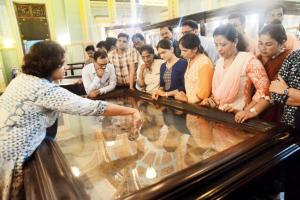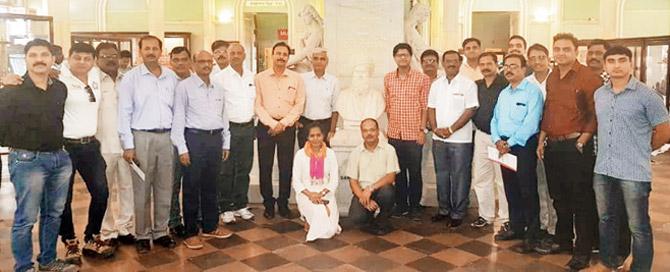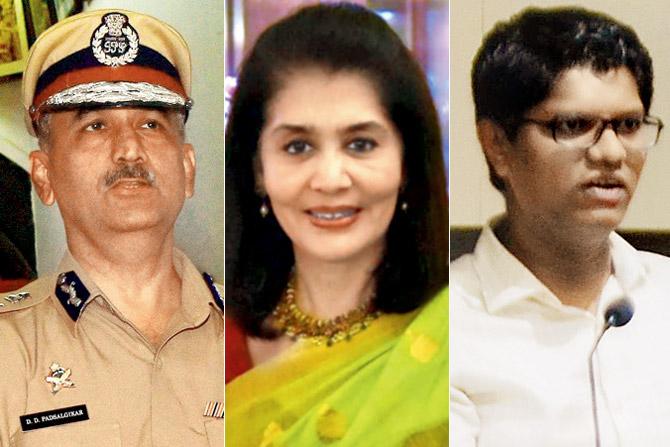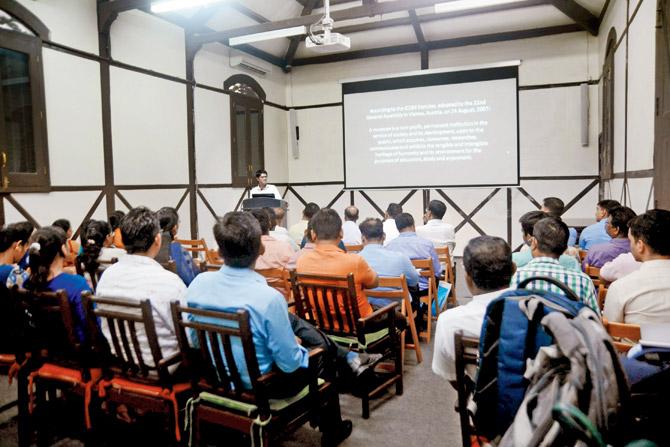Dr Bhau Daji Lad City Museum conducts first training workshop for Mumbai Police to lay groundwork for forthcoming museum

Participants from Mumbai Police are all ears as the museum staff explain a display
For three days in late August, as visitors explored Dr Bhau Daji Lad (BDL) Museum at Byculla, the city's oldest, they would've barely noticed a group that was closely studying its artefacts and displays, and listening with student-like attention to museum staff members who guided them around the landmark's treasures with equal intent.
ADVERTISEMENT
Turns out, this group, a team of 40 men and women from the city's police force, were participants of the inaugural capacity building and training workshop conducted by the BDL. This programme is the first step towards sensitising and creating awareness for the Mumbai Police Museum and Archives that is scheduled to open to the public next year within the premises of the Police Commissioner's Office near Crawford Market. The session covered areas from management and care of exhibits to preventive conservation outreach programmes, and managing of people.

Members of the team were guided on management of people inside a museum
Heritage in khaki
"Four-five years earlier, I had done a survey of the state's museums after Dr AP Jamkhandekar, noted scholar, had pointed out that training facilities to improve the museums of the state were lacking. A year ago, we (BDL) had written to the Ministry of Culture (Maharashtra) to suggest that our space and 360-degree expertise could be used as a training ground. About three months ago, the then Commissioner of Police (Mumbai) and now state Director General, Dattatray Padsalgikar approached us, suggesting that we plan a programme for their personnel (all at senior police inspector level) in light of the commissioned museum and archives centre," shares Tasneem Mehta, Managing Trustee for Dr Bhau Daji Lad Museum and former vice chairman of INTACH, about how the two institutions got associated with each other.
"In the late 1980s and 90s, we had a space where artifacts, archives and vintage police uniforms were stored. I felt that such treasures should be a part of our heritage, and so we decided to fructify this idea," shares Padsalgikar. The former Mumbai top cop credits Mehta and the BDL Museum for giving wings to the idea. "We had to start training our staff who would have to help set up this museum from scratch," adds Padsalgikar, who picks the Washington and London Police Museums, and the FBI Museum as most impressive.

D Padsalgikar, Tasneem Mehta and Himanshu Kadam
Working model
The three-day workshop was conducted in Marathi, and Himanshu Kadam, assistant curator at BDL Museum, who helmed the initiative, was faced with several challenges even before he stood at the podium to welcome these 40 participants. "We had to start from zero as it was an absolutely alien concept. To explain museum terminology and other related glossaries in a simplistic way, we had to break things down at every level. Animation videos were created to offer an idea of the workings of museums.
Virtual tours of police museums in London and New York ensured sessions didn't get too theoretical," he recalls, sharing how the museum staff also had certain assumptions that had to be tweaked as sessions progressed. "At the end of each one, I would throw the topic open to them for questions, answer each one, and move ahead," adds Kadam.
The group was picked from an internal selection process held at the Commissioner's office, reveals Padsalgikar, and comprised personnel from their late 20s to their 50s. "Naturally, we had to keep this in mind at every stage of the programme, before moving to specifics," Kadam shares. "We had to remind ourselves that they had no background in the arts and history. At the same time, we had to convey the importance of running a sustainable model that also involves aspects like inventory management, digitisation, conservation and the two very critical issues of humidity and poor handling of objects," shares Mehta.
Learn, train
This first workshop turned out to be an eye-opener for both sides. "Our perception about the police force changed. This museum is bound to transform the public's notion about them," relays Kadam, a sentiment echoed by Mehta, and Padsalgikar, who gave the workshop a thumbs-up, going by the feedback that resonated across the corridors of the police headquarters.
But the biggest cheers, emerged from the participants: "It [the training] was a mind-blowing experience. It was wonderful to see all the exhibits preserved so well here [at BDL]," shared Pradip Lonandkar, retired Assistant Commissioner of Police and now secretary of the Mumbai Police Museum Trust in a video posted about their experiences on the museum's website. In another video, Rajeev Samant, Senior Police Inspector, felt that the workshop would hold them in good stead in the future, when work commences around the museum and the archives. "Vegle vishay aahe parantu tyat evda easy karun saglya goshti shikavlelya [It was a different subject but they taught all of it to us in an easy format]," he signed off.

About the museum
* The museum will be set up on the ground floor of the heritage building within the Commissioner's complex
* It will cover six rooms, including a large corridor
* The museum will highlight important pre and post Independence events that occurred in Bombay, including Gandhiji's arrest from Mani Bhavan on January 4, 1932
* Displays will showcase the city police force's important trials, cases and other historic episodes of its rich legacy
Catch up on all the latest Mumbai news, crime news, current affairs, and also a complete guide on Mumbai from food to things to do and events across the city here. Also download the new mid-day Android and iOS apps to get latest updates
 Subscribe today by clicking the link and stay updated with the latest news!" Click here!
Subscribe today by clicking the link and stay updated with the latest news!" Click here!






